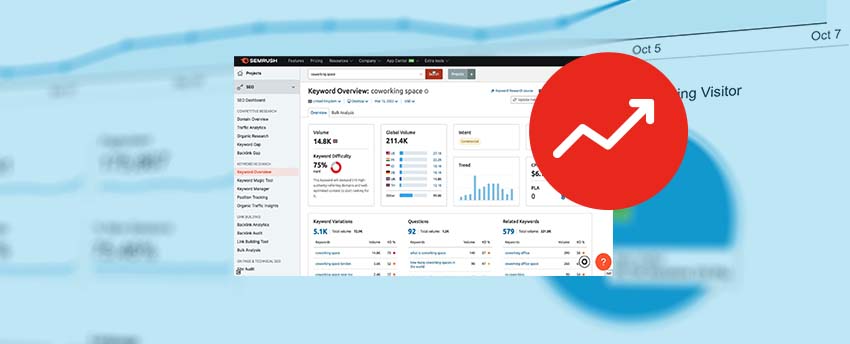In a fast-moving world, it's understandable that businesses put some energy into figuring out how to improve search rankings. The problem is they often want to see dramatic improvements quickly. However, improvements are usually incremental and require hard work and persistence. Impatience leads to taking shortcuts and often brings poor results. You have to accept it's a long game, and here's why.

Securing Search Engine Traffic Is Hard
Despite the plethora of SEO experts who claim to be able to propel your website up the search rankings quickly, most of them can't, or at least they can't do it sustainably and safely. I know it's appealing that you could jump straight in at number 1, and it's easy to see why so many businesses are seduced by those who promise amazing search rankings. Do yourself a favour, don't be one of them. Improving search engine rankings is a considered and strategic endeavour.
SEMRush, who knows a thing or two about SEO, claim, "SEO should show results within a 6- to 12-month period", and we tend to agree with them. Sure there are exceptions for businesses in uncompetitive niches, but they are few and far between.
We're not suggesting for one moment all search experts who claim to be able to move the dial quickly are bad, far from it, but those claiming to have special relationships with Google™ or to have the secret sauce to make dramatic changes in rankings quickly rarely deliver on their promises. In fact, if you follow Google's guidelines on improving rankings, you can't make dramatic changes quickly; it's always incremental.

It's Hard For A Reason
If you're not convinced, think about the prize on offer. Search rankings all but guarantee a steady flow of potential customers. What's that worth? If you rank in Google for what your potential customers are searching for, they will find you and potentially buy from you. It's like nothing else that's come before it.
It's not like TV advertising. That only worked while you kept paying the TV companies. It's not like magazine adverts that only worked while you kept paying; anyway, your messages were being shown to everyone, even those who would never buy from you.
Think about how different search marketing is. People who want what you're offering are shown what you have on offer, 24/7, for no money. Why would anyone think achieving that would be easy and cheap? It's a remarkable lead-generation tool.

It's Not Just About Rankings
Of course, before getting into what a strategic approach to improving search rankings looks like, it's worth noting that rankings alone won't bring in enquiries. Getting eyeballs on your web pages is a great start, but you'll still need to convert those people into potential customers by getting them to make contact.
This falls into an area of digital marketing known as Conversion Rate Optimisation or CRO.
Without going into too much detail here, CRO is a process that involves a lot of experimentation and data analysis to improve web pages so more of the people who visit it do what you want them to. It makes sense to include CRO in your strategy speaking of which.

Start With A Strategy And Be Patient
To secure good search rankings, you need a strategy. You need to understand what your customers are searching for, be realistic about what you can rank for, and proactively chase the rankings you want.
A simple way of thinking about strategy is to consider how or where to play and how to win. For example, you may establish that your ideal customers type a particular search term into Google, but the competition is so significant you're not going to attempt to rank for it. That's a strategic decision only to pick fights you think you can win.
Without a strategy, you'll flounder and almost certainly fail, and don't fall into the trap of confusing your goals and your strategy. A strategy is only a strategy if there's an associated plan.

Strategy And Goals Are Not The Same
We're doing a lot of work on strategy just now because we're five years into a SaaS project creating a web-based tool for managing strategy. What's clear to me is many people confuse strategy and goals. They are different, very different.
For example, if you were to tell me that your strategy is to rank for a specific search phrase to generate search traffic and, from that traffic, gain enquiries or leads, I'd advise you that what you have isn't a strategy; it's a goal.
My next question would be, "What has to happen for you to achieve that Google ranking?". Your answer, if you gave me one, might be your strategy.
To take that point even further, one of the ways you could improve your rankings is to secure links from other websites. Your goal might be to secure ten relevant links; your strategy would be how you secure them.

What Might A Strategy Look Like?
 So, if stating, 'we will rank for the keyword xyz' isn't a strategy, what is? Perhaps something like this.
So, if stating, 'we will rank for the keyword xyz' isn't a strategy, what is? Perhaps something like this.
We've identified that our potential customers search in Google using the search phrase xyz. Currently, we don't rank in Google's top 100 for this search phrase. We're going to do the following to address that:
- Create a highly optimised web page targeting a competitive phrase like SEO Glasgow.
- Create 20 blog posts over the next three months on the subject of xyz with internal links to our new page. Here's how to blog effectively.
- Socially share links to our new blog posts.
- Create an e-book about xyz for people to download.
- Create a series of help videos for people considering purchasing xyz
- etc..
You now have a strategy to secure a Google ranking for the search phrase xyz. Of course, this is somewhat simplified and ignores who currently ranks for the phrase and other external factors, but you get the idea. The point is, rankings don't just magically happen, or at least they rarely do. They happen as a result of effort. They happen as a result of patience, and they happen as a result of incremental improvements.
Need Some Help Improving Search Rankings?
Hopefully, this article helped you better understand how to improve your rankings. If you'd like to discuss how engaging with an agency like ours can fast-track your journey to better search engine positions, we'd love to chat. If that's not right for you, then perhaps a no-obligation website audit would suit you.
Whatever you decide to do, make sure you do something. Securing traffic to your website from search engines can transform your business, and starting now is better than starting next week.

